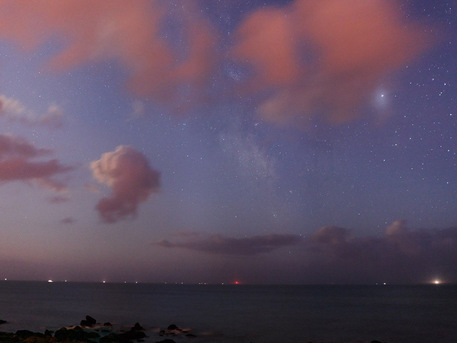Calendar
Why does a week have seven days?
 © NASA |
Our calendar is inspired by the other planets of the solar system
The names that we use for the days of the week originated from different cultures and mostly refer to one of the seven celestial bodies or to the planet-god watching over a particular day.
The names for the days of the week are derived from celestial bodies.
Sunday and Monday are quite simply the day of the Sun and the day of the Moon. The English name 'Tuesday' still provides us with a clue as to the planet this day is named after: Mars, the Roman God of War, was known as Tiu to the Germanic peoples. 'Day of Tiu' or 'Tiu's day' eventually became 'Tuesday'.
The next day of the week, Wednesday, also has a connection with the planets. In Italian, this day is called 'mercoledì', a word in which the name of the planet Mercury can be recognized. Thor, the Germanic god of thunder watches over Thursday. In this case, Thor represents the planet-god Jupiter.
The planet Venus appears in the word ‘venerdì’, the Italian name for Friday. In English 'Friday' was named after the Germanic goddess Freya. In the word 'Saturday' the name of the planet Saturn can still be recognized.
Credit: German Aerospace Center
Calendar
Why does a week have seven days?
 © NASA |
Our calendar is inspired by the other planets of the solar system
The names that we use for the days of the week originated from different cultures and mostly refer to one of the seven celestial bodies or to the planet-god watching over a particular day.
The names for the days of the week are derived from celestial bodies.
Sunday and Monday are quite simply the day of the Sun and the day of the Moon. The English name 'Tuesday' still provides us with a clue as to the planet this day is named after: Mars, the Roman God of War, was known as Tiu to the Germanic peoples. 'Day of Tiu' or 'Tiu's day' eventually became 'Tuesday'.
The next day of the week, Wednesday, also has a connection with the planets. In Italian, this day is called 'mercoledì', a word in which the name of the planet Mercury can be recognized. Thor, the Germanic god of thunder watches over Thursday. In this case, Thor represents the planet-god Jupiter.
The planet Venus appears in the word ‘venerdì’, the Italian name for Friday. In English 'Friday' was named after the Germanic goddess Freya. In the word 'Saturday' the name of the planet Saturn can still be recognized.
Credit: German Aerospace Center





